Blog
- Details
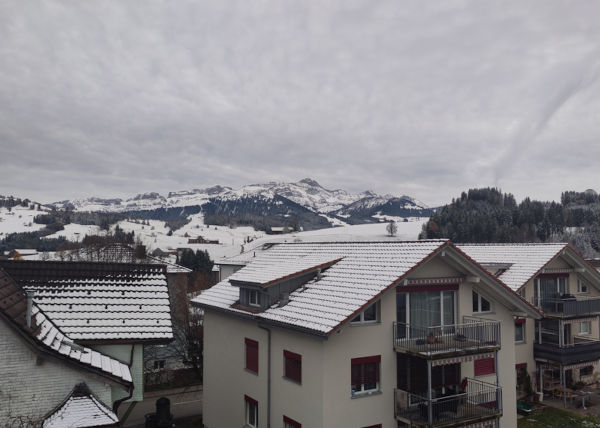
Snow covers the streets of Waldstatt. The surrounding hills are a beautiful white, and the sky announces that Winter energy is upon is. My usual walk at dusk through the local hills, which takes about an hour, is surprisingly empty of life: no deer, foxes, birds, or cows to be seen anywhere. The mighty Säntis mountain peaks out wearing a white coat as clouds hover at it’s shoulders. Everything seems to be slowing down.
Such a mood has its quality of acquiesce, of acceptance that long cold months are encroaching on our warm autumn days, nothing to change that, best not to strategize or evade the fact of entering a new winter season.
Other feelings might arise when cold approaches and days become very short. Endurance can seem to wane, motivation flattens out, our bodies don’t feel aligned with our appetites, and we might feel just plain tired all the time. The local Swiss woman who cuts my hair dreads winter. She has to drag her stiff body out the door and walk a few hundred meters to her salon, and her facial expression shows that she has to battle.
If I have a miserable relationship to the season, the cold, and the darkness, I might suffer. And that affects others around us.
I spent many years in close quarters with Shodo Harada Roshi. We were very privileged to see him from morning to night and how he dealt with tiredness, grumpiness, and frustration. He spent most of his waking hours helping us overcome such challenging mind-states, but once in a while, one could sense that he too was exhausted. I cannot overstate how hard this man works and how much he can accomplish in a day.
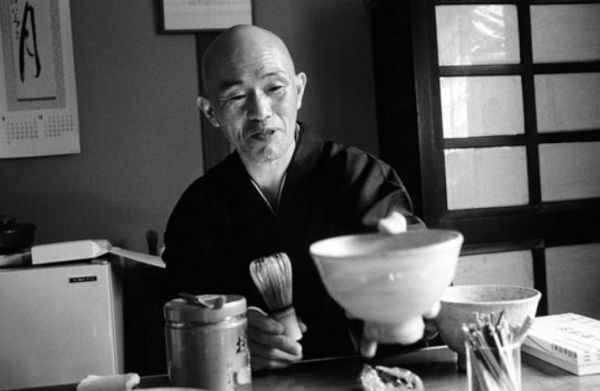
Over the years, I was brought to have tea with the Roshi for no apparent reason. Sometimes there would be chatter, but often there would be silence. The Roshi himself would at times make a matcha tea for himself, but more often he did not. He just offered. And what I also noticed as the effects of the tea and the Master’s presence elevated my spirits was that his sharing and giving as also his tool of regeneration. His generosity was also his source of rejuvenation.
Of course, giving is an art and the Roshi revealed often enough that he was a great student of life. I try to see this very deeply, because it seems to be a means of overcoming the difficulties that often arise at this time of year. In a strange way, our need for connection and fresh energy is zapped by our own consumer society. We are encouraged to consume more food, which might be appropriate. After all, the animals gain some substance in the cold season. But if our consuming is unhealthy, we often never shake the cold, heaviness, or loneliness. We take in more and more, but never feel truly satisfied. Only exhausted.
But, what if we shift our attention to the state of others? What can we offer them? What small thing can we do for them? How can we meet them, move with them, share ourselves with them so that we both reconnect to the rhythms of life that pulse through the snow, rain, and cold? If I see the vitality in this way of being in the world, I want to learn that art of generosity that the Roshi so beautifully embodies.
There is nothing new here. Dickens wrote hundreds of pages on this point in ‘A Christmas Carol’ and every Christmas film portrays the miracle of sharing hearts rather than being in conflict. And yet, we encounter challenges to embodying this wisdom. With the overwhelming pressure we m might face just to stay healthy, keep appointments, get the necessary Christmas gifts and cards prepared, and handle the heavy load of work that seems to increase at this time of year when energy is so costly, getting in touch with generosity might feel counter-intuitive. But the heart has tremendous power. It will brighten our tired bodies and minds when we sincerely connect and serve. Under the dull gray skies of Winter, we might just need a cue, a gesture to help us tap into it.
Good to get started, I think. I will drink a matcha tonight and think of Shodo Harada Roshi, but I hope to offer you one as well very soon!
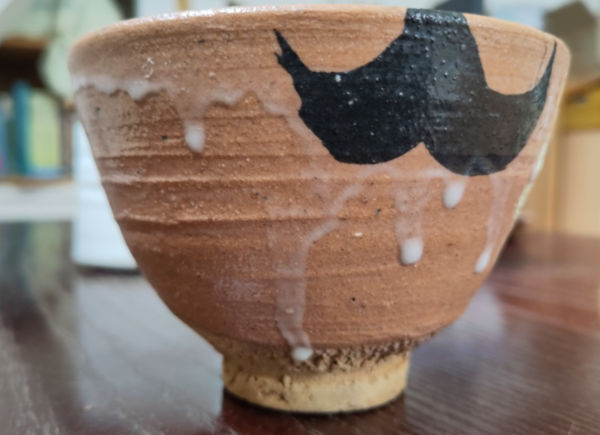
- Details
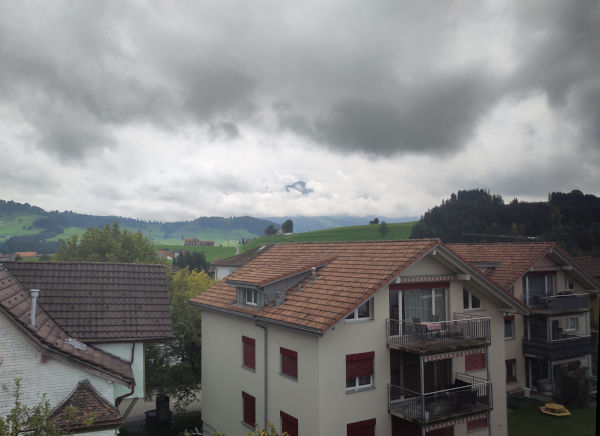
Clouds move swiftly through a sky filled with many shades of gray. The energy of autumn is palpable here in the northeast of Switzerland. Cows are being led back down the mountain after months of grazing at higher altitudes, which they must certainly enjoy more than the life in confined stalls on the small farms where they spend most of the year.
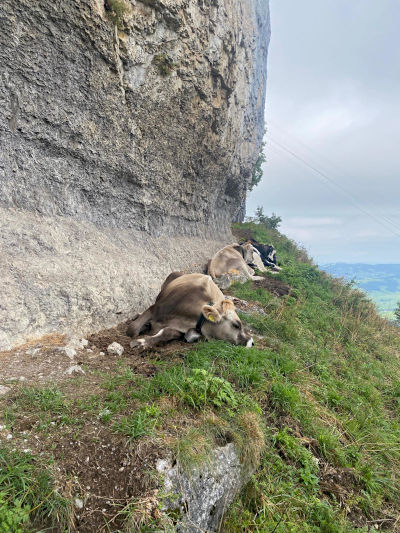
Friends and I continue to walk in the hills and mountains, swim in rivers and streams, and discover new paths through the Alpstein area, which never ceases to offer its intense presence to us. Though human beings have settled in this area for many centuries, Nature is still obviously the master of Appenzell. Weather changes are rapid. We leave the house prepared for rain, sun, cold, heat, and a swim. We are blessed so far to gradually gain strength and endurance which allows us to go higher and further. Neither my wife nor myself measure our steps or our time. We are sensing deeper pleasure in our inner life, a deeper relationship to our area, and perhaps some of its mysteries are revealing themselves as we spend more time here.
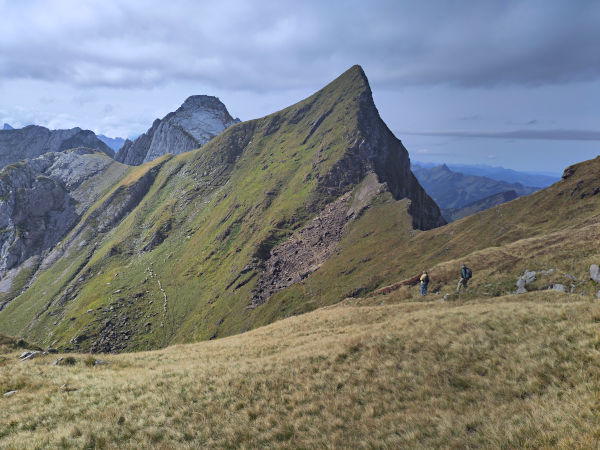
What gratitude we feel for the opportunity to unravel some of Nature’s mysteries and unravel our own innermost life in this life!
In my recent travels to the United States, I could taste again just how wondrous Nature reigns. We had our fill of desert and beach in Southern California and forest and ocean in the Northwest. Of course, the mountains are high and mighty there as well. Eagles, large deer, seals, otter, and even a large owl were visitors along our path, and none of them needed to run or fly away quickly upon meeting us. The harmonious dynamic of Nature in such grandeur is a great gift to encounter.
Another aspect of America is also great: the people. Through talks with family members and old friends, I could confirm that America has many outstanding, intelligent, loving people to encounter. And at the same time, it is indeed apparent that stress, controversy, alienation, and fear are on the rise, and no one expects things to improve soon. We sensed that politics and strong social swings are disrupting the flow and harmony people are used to.
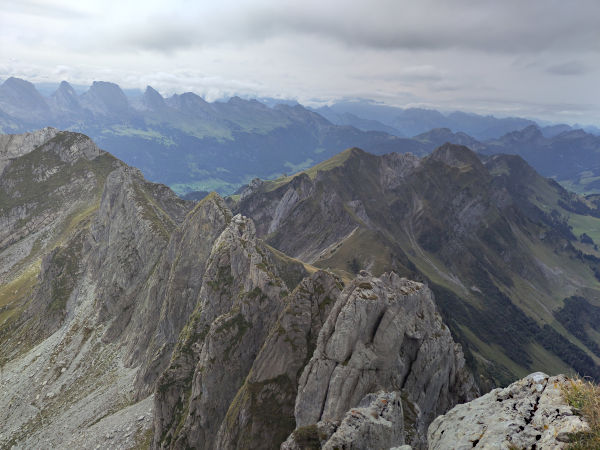
Back here in Switzerland, we recently hosted a retreat attended by ten people. One of the participants is a refugee from the Ukraine. He is a talented artist named Basil. Basil has a deep interest in art and Zen Buddhist practice. But life and the pure heart of human beings are what interest him most. His own heart is heavy with all that has happened in his home country. He left because he did not want to kill another person. His flight from the Ukraine is an amazing story of perseverance. Gangs of men were hovering around his neighborhood and literally arresting them into the military. In order to avoid this fate, he walked nine days through wild forest to get into Romania. Great dangers were involved, physically and psychologically. He arrived in Switzerland with almost nothing but a few clothes. He is a very caring, intelligent guy. He is able to start a new life here, and I am sure he will have success as a person and as an artist.
Basil spoke to me about his experience of leaving the Ukraine. He had goals. He wanted to live in peace and harmony. He knows their value. He has some contentment at the moment, because these things are possible for him now. While he still follows the daily news of drone strikes and political stagnation which are costing many lives, he recognizes what it is to exist in a place where the battle for survival is not a primary difficulty. Here, one has to earn some money, sure, but Basil can receive support until he has learned German well and can even study if he wants. He has been treated decently.
Basil is an amazing example of a human being who knows horrible conflict and yet is willing to make incredible efforts to find harmony and peace for himself and the world around him. I am happy that he has received support from this society, because it shows that if a local community is able to support people who must leave their homelands, help them assimilate and cultivate their lives, it creates a greater trust in those virtues of peace and harmony, even in people who know very well the sound of bombs and bombers moving in the sky over their head.
Americans do not have bombs flying in their skies. But America is a country in conflict. Gangs are collecting people on the streets, much like in the Ukraine. It seems right now that most Americans have much less confidence in the possibility of human beings living together well than Basill does at the moment, even with the horrors he has known firsthand. He loves his people, but he loves life enough to sacrifice being there so he can cultivate his heart and mind, share his talents, and not kill others in a war that has meant only destruction and pain to his countrymen.
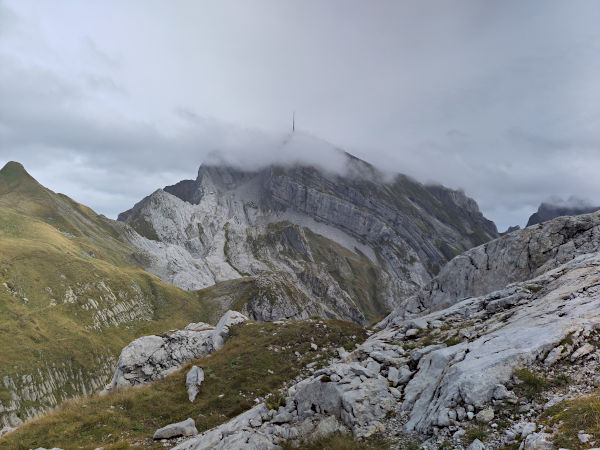
Walking in the mountains here in Switzerland with Basil, I see him smile more and more. I think I will take more walks with Basil through the green valleys and up the steep slopes of this idyllic place. One can see quite far from the peaks here. With our hearts in tune with each other and with the powerful silence of massive stone under our feet, we will keep looking at the USA and the Ukraine. We will never ignore the place and people we left, or the escalating violence and devastation there. But the silence of the Alpstein and the granderous Säntis mountain call us to listen within. Words like peace, pure heart, and harmony fall away. They are unnecessary. But they may be needed again soon.
- Details
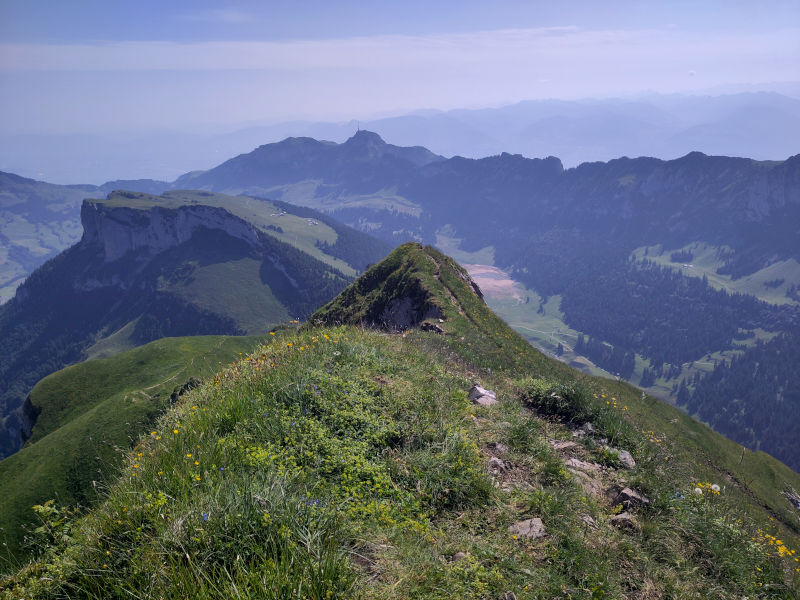
I was again able to trek through glorious Swiss mountains near our home yesterday. Vivid colors dotted the landscape, wildflowers! And since I had to walk very carefully amongst the steep rocks, I was continually enchanted by the bright patches below my feet. Dotted landscapes of exquisite design, both the gentle and the strong in all their splendor, true glory!
Such moments are good for my soul, good for my health, good for my mind. I then observe through newsreels a world of nations reeling in escalating violence. Fear, anger, and distress cover the people’s faces. It certainly causes me to reflect on war and peace.
I want peace for myself, my friends and family, and for you. There is much to discover in the mind, body, and soul, using our chance in this human form to enrich the life-force in us and around us in quality and quantity. Realizing we are more than the body, more than an animal bound to survival mechanisms, we let life live itself, heal our inner and outer injuries, and discover ourselves to be something like energetic pulsing rhythms that transform and thrive through interaction with other living things. We are at our best when we feel ourselves in a higher vibration, as a higher vibration. Even when deep awareness fades, a confidence in the flow of life remains. Grace!
When we are confronted with the outer world, we enjoy its happy moments, but also try to avoid the things we see in the news: conflict, alarm, anger, hatred. Thoughts of protection and retribution bring us down. We see our world as a heavy place. We are afraid to ignore threatening images, knowing that the physical health and continued happiness of ourselves and others we care about could be at stake. We abhor suffering loss. Battle becomes an option in our heads too.
But many of us are aware enough to know that hate and anger, revenge and retribution have never worked very well if one’s goal is inner freedom. As rationally as we can explain it to ourselves, violence is a dreadful compromise. Win or lose, the trauma of hurting and killing others causes conflict that keeps us divided from other good people and busy in our souls for a long time. Many are aware that more United States soldiers committed suicide after their experience in the second Iraq War than actually died in battle.
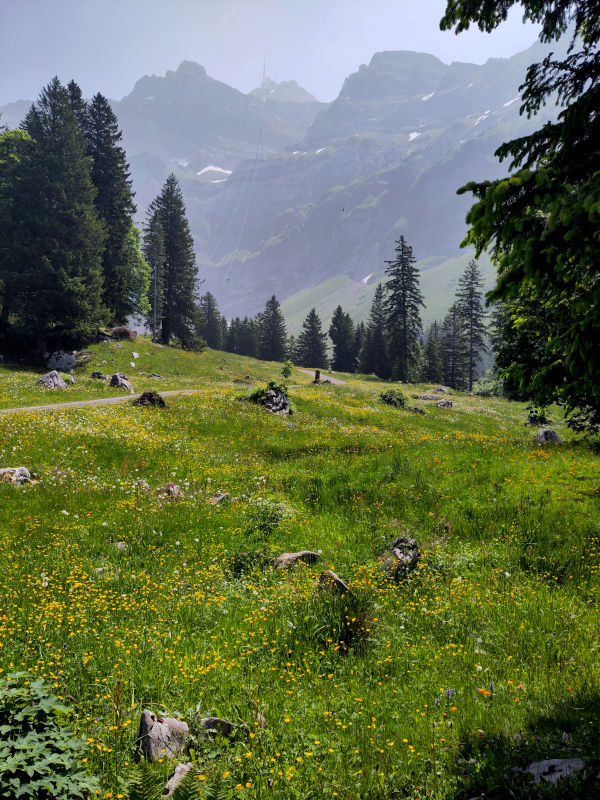
I often have strong feelings when it comes to the United States of America. Many fantastic things have happened in the U.S.A. and there are millions of fantastic people there. But clearly, an attitude of arrogance, fear, and readiness to use violence exists. I wonder if I can see these old patterns in myself. If not, how can I ever be free of them?
My answer and my resolution: Observe my reluctance to change.
The I Ching, The Book of Change, is a very important source of insight that has been highly respected for thousands of years in China and has influenced important Western thinkers such as Gottfried Wilhelm Leibniz and Carl Jung. The book’s description of ‘Peace’ is intriguing.
Peace, in the I Ching, comes about when strong yang energy is below and soft yin energy is above. In our bodies, we might know this state when we wander into Nature and feel its power and its blessings. Our strong energy (qi) has awakened through movement and soothes our pounding mind. We sense heavy thoughts and feelings weaken and even dissolve. We sense ourselves as intimately connected to the universe. Our active mind and muscles are infused with the subtle forces of breath within and without and are aware of beauty within and without. We feel a flowing harmony in ourselves which we recognize also pervades all life. Connected to the universe, profound gratitude arises. Virtues of humility and generosity naturally manifest. We feel like sharing.
In collective social and political units, this ‘peace’ means that leaders are yielding and willing to merge their will with the will of the people below. “Their powers unite in deep harmony… the good are in control, and evil influences come under their influence and change for the better.” School teachers, baseball coaches, good bosses, and spiritual masters have helped me in my life tremendously. Abraham Lincoln, Gandhi, and Gorbachev remind us that this can happen on the bigger stage of politics as well.
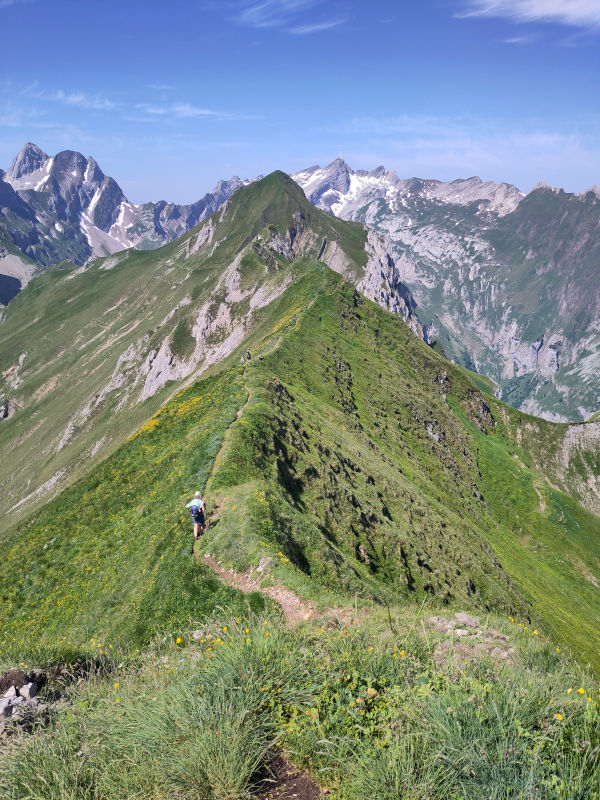
When peace’s opposite arises, when the strong yang energy above continues its rise and the yielding yin energy sinks without being supported from below, lack of progress occurs. In the I Ching, the opposite of ‘Peace’ is ‘Stagnation’. This state of inertia arises when ‘the creative powers are not in relation. It is a time of standstill and decline.”
We know this stuck feeling in our bodies and minds. The inner sun pulls away, the weight of our thoughts and feelings sinks down, and we feel ourselves to be the desert in between. We try to function well, but if this stress goes on too long, we experience burn-out. Frustrated, our brain can produce negative, destructive thoughts.
But, if we are attentive to our mind-states, our trust in life infuses us with light and hope that things will change soon enough. Healing power is there for the body and it usually guides us back to health. It also gives us information for how to proceed. We need our intuition to understand it and our courage to carry it through.
When it comes to stagnation, to prolonged conflict in society, the principle is the same. We enable support when we rest our fears, hateful thoughts, and aggression, and use our natural wisdom to attract and encourage innate corrective qualities. Something good will evolve out of stagnation if we allow it to move along. It might not look so good at first, because it is not the change we expected. We keep looking, and perhaps we are the ones who are part of stagnation evolving into truly peaceful action.
If we can’t move on from an illness, a traumatic reaction, a feeling of superiority, fear, or hate, and give no space for it to change to a virtuous attitude that engenders peace, we shape the world around us in conflict and those old patterns dominate the world our children grow up in. If we force our idea of change out of an emotional reaction, it also doesn’t work well. We see a world that continues to lack peace.
Today, I feel soothed and invigorated by my walk. And, I have strong hope for a world that will know peace and will endure well times of stagnation and conflict. The mountains and the wildflowers affirm!

- Details
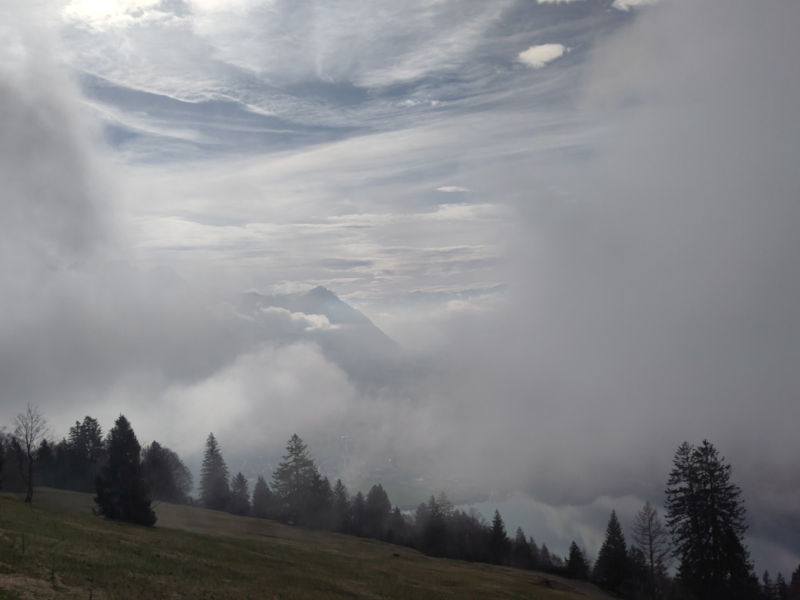
The emergence of Spring seems to have halted for a few days here in the northeast of Switzerland. Fog and low temperatures create the chilly atmosphere of being in a massive refrigerator. People here in Waldstatt chat about the weather like everywhere else, and locals reassure me that wonderful weather is coming next week. I am fine with the cool, damp days, though. The energy is very good for meditation and contemplation.
Many people who know me are aware that I spent quite a few years as a monk in Zen Buddhist temples. One question that people quickly ask me is, “Why did you leave?” Honestly, I used to be offended by this question, since I doubted that the people asking me about a very difficult transition in my life had grasped why I had come to live as a monk and why I stayed so long in the monastery. We were discussing my very personal relationship to Buddha, Dharma, and Sangha, and not the weather. Perhaps it felt like a stranger asking me about a former marriage and wanting to know why I divorced a wife I had loved very deeply.
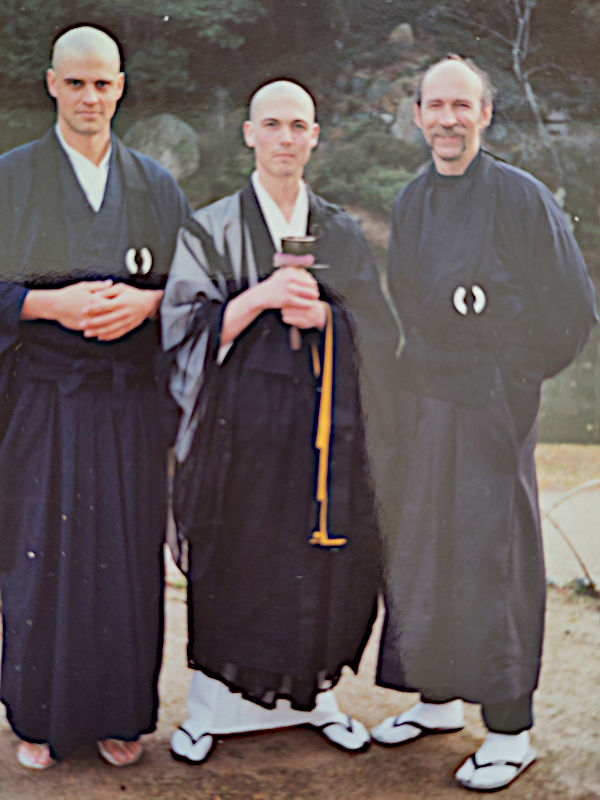
I have come to understand better why people spring towards the end of my monastic story. It is not easy to be patient in understanding our challenging lives, or anyone else’s. Many of us have a monk or nun in us that would like to take a good chunk of life in a remote place to go within, supported by like-minded people. It also suits most people better to let go of this idea and commit fully to our lives right where we are in the world.
For me, going to a temple was not an experience to put in my pocket and say, “That was interesting, what’s next!” It was an incredibly challenging chapter of my life, where I built powerful relationships to places and people that deepened over time and shaped my being profoundly.
A big part of my ordination was accepting the Zen Buddhist community as my family. It was a true act of ‘leaving home’ and this ritual was highly impactful, emotionally, psychologically, and energetically.
Leaving home….what does it really mean? In 1985, I certainly wanted to get away from the materialism and deeply engrained attitudes of collective and individual self-centeredness that reigned in the USA as I knew it. I had been a History student in Europe in 1983-1984 and lived in a country with a wall down the middle of it. I had visited many Eastern European countries with a fondness for Marxism during that time. What I saw during those visits was poverty, pollution, and guns. I had never been exposed to those things, which weakened my enthusiasm for socialism/communism.
At university in the city of Göttingen, I was constantly confronted by students to explain the American perspective on the issues of the time: the Philippines, Nicaragua, El Salvador, stationing nuclear missiles in W. Germany, and more. There were many important topics, and I was not at all a master of debate in those days.
When I returned to the States, Ronald Reagan was re-elected as president in a landslide. But it seemed to me that the American public showed almost no interest in critical discussion of major international issues. Simplistic Cold War rhetoric was enough for almost everybody around me. But the superficiality of mainstream thinking about social issues in my generation was frustrating. There was so much suffering out there, much of it a result of decisions made by Americans like myself. And there was so much maturing to do, work to do on myself, so I might feel useful in a very complicated world. Or, was I becoming a crazy person? In any case, at home, I felt like an alien.
Alienated but still hopeful, I was able to get a one-way ticket to Japan after graduation. My plan was to saturate myself in things Asian. While still a teenager, I had encountered an Indian sage, J. Krishnamurti, and had met a Buddhist monk from Sri Lanka in a university course. I had read many spiritual books. I was exposed to Zen and began to meditate on my own in hopes of dropping off my neurotic thoughts on the path to discover the heart of selfless service. These influences came from the East. After losing faith in any healthy socialist or communist developments at home or in Europe, I wondered if societies in the East might be healthier than mine. I could teach English in Japan to earn money, and eventually see all of Asia. This was my hope. I had to leave home.
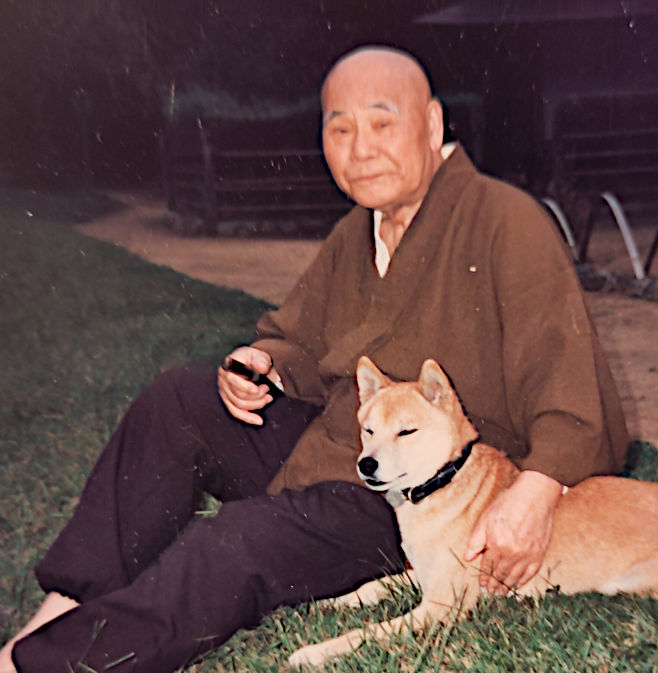
After becoming initiated in Aikido and the shakuhachi (bamboo flute) and traveling around Japan for a couple years, I had seen enough of modern Japan. Almost all people there were content with the materially based life that I had already experienced as a youth in Southern California. I yearned to touch the depths of the oriental soul and thus, could no longer motivate myself to teach English to adults and children addicted to video games, canned coffee, and manga.
In my second year in Japan, I traveled down to Hiroshima. On the way, I chanced upon a temple in Okayama. I pulled out my bamboo flute to play a few notes and saw an elderly priest with a Yodo-like aura taking a walk. His dog came to greet me. A conversation ensued. He told me foreigners were doing Zen training there. My Japanese at that time was not good at all, but something very important was communicated. A door was opened.
A year later, I thought of the temple where I met the remarkable old monk and where foreigners trained in Zen Buddhism. I made a short visit. My next visit was longer. Six months later, I moved into the Sogen-ji temple.
I cannot say that I consciously searched for that temple or wanted to become a monk. These things happened after my hopes had ripened into a commitment, a vow, and I was ready to sacrifice a good chunk of my allotted life-energy to the Zen master, the teachings of the Buddha, and the Zen community. This initiation meant an abrupt end to reliance on material or emotional support from ‘home’.
I am trying to put down my hopes and experiences in the temple in a book form, perhaps a novel. Images and descriptions are better at communicating whatever has transformed within me than explanations. Something left home during that time in the temple. Something can now see and persevere in a way I couldn’t before. But for the mind that wanted a perfect world, or to become more perfect myself, there was only ‘Great efforts, no results’. Do you know this?
I actually have little natural talent for anything meditative. However, being a good meditator did not turn out to be the heart of the training. The Zen master helped me grow healthy roots in my being, that a tree with some good fruit might have a chance to grow. The Master gave me the name of Do Yu, ‘the way of Abundance.“
So, this is a bit of why I went to the temple and why I stayed fifteen years.
Still wondering why I left?
Yes, I left home again, and it was difficult!
Evidently, I had enough hope and intensity at that time to take a step beyond the temple world and remain true to my quest to become useful and content with my activity in the world. The world outside the monastery is not in better shape, and it has not been easy to adapt to it again. But, many years after leaving my life in the temple, in the cold and fog of my village home here in Switzerland, my tree continues to grow, and fruit ripens. Oh, and good weather is coming!
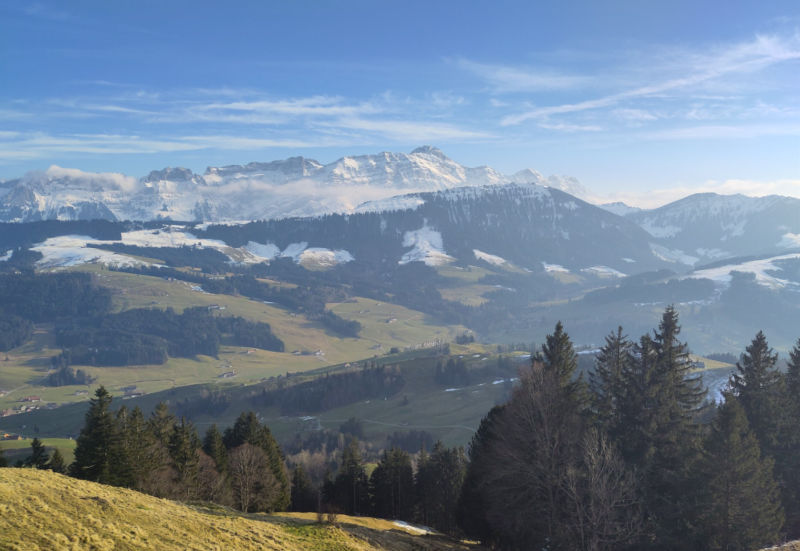
- Details
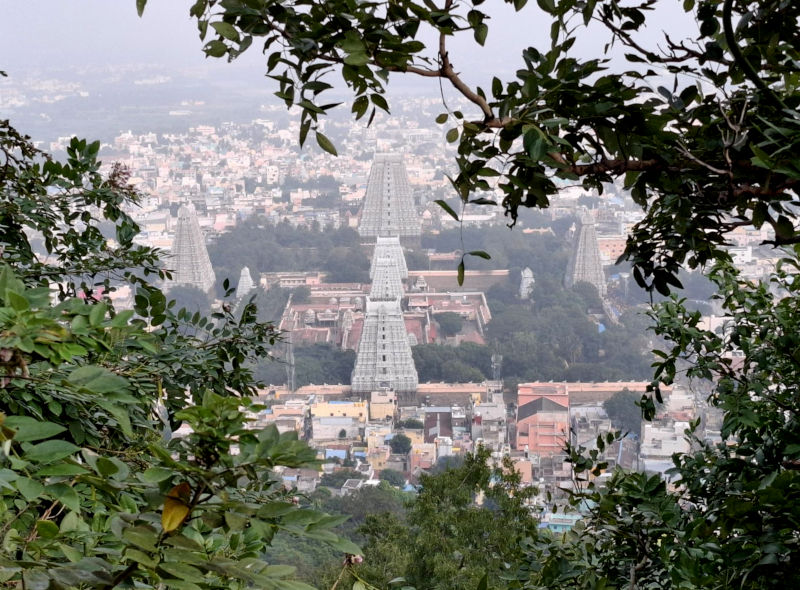
I was recently in South India, leading a group of five through my favorite places there. I have returned with brightness in my heart, and again deep respect for many Tamil people. People’s lives in South India are not as comfortable as mine. Some of my friends are very poor indeed. But they have big hearts.
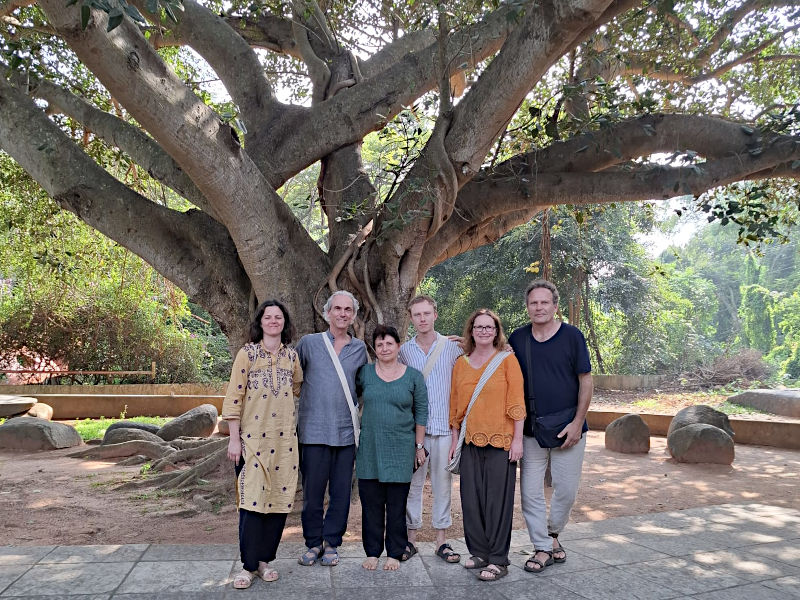
Interactions with such people is refreshing to say the least. In light of politics, wars, and widespread increase in health issues around the world, we often feel caught up in cycles of human history as it plays out through journalism. We can feel like victims of the media. We certainly don’t have to identify as intensely as we are encouraged to with the cycles of life as they are portrayed in CNN or YouTube videos.
My time in S. India allowed me to sense an abundance of hope and confidence as to how beautiful, profound, and rich life is and can be for all human beings. I wonder if you think this is odd. Do I read like a cheerleader for humanity? In any case, I suppose this radiance that expands is why I have spent so much time in S. India and why I continue to lead travel groups there.
But it is important for me to ask myself what it is that dulls our bright nature. Something shines inside resiliently within human beings wherever I go. Why do we cover it over with dramas, power games, and violence? Why do we constantly stimulate our fears?
I think the answer, simply put, is that we don’t know enough about ourselves, and we are in the habit of not confronting ourselves in a deep, honest way. Self-awareness is not really measurable, but we can sense intuitively if someone is awake and has learned to face their challenges in a healthy way. People who have realized something beyond their egoistic idea of themselves naturally cultivate more virtues like silence, humility, and generosity. And we look for these qualities in our teachers, artists, and political leaders.
In my life, when I felt myself at a crossroads and needing to connect more deeply within and with those around me, I went to South India. The air and soil in this part of the world suffer from pollution, but if you shift your gaze, you sense quickly that the land is palpably rich in spirituality and has been for a long, long time. It is said that Bodhidharma, the Dhyana-Zen monk who is known as the 1st patriarch of Zen (Qigong schools love him too!), is said to be from Kanchipuram. Krishnamacharya taught yoga asana to the founders of the Iyengar and Ashtanga in Mysuru. The Theosophical Society has its headquarters in Chennai. J. Krishnamurti, the first awakened person I saw in person in Ojai when I was 17 years old, is originally South Indian. Sri Aurobindo and ‘The Mother’ established themselves and a large spiritual following in Puducherry and Auroville. And Ramana Maharshi, a modern Hindu sage who introduced self-enquiry to Western minds and still influences many today, spent most of his life at Arunachala, a mountain in Tiruvannamalai said to be the embodiment of Lord Siva himself.
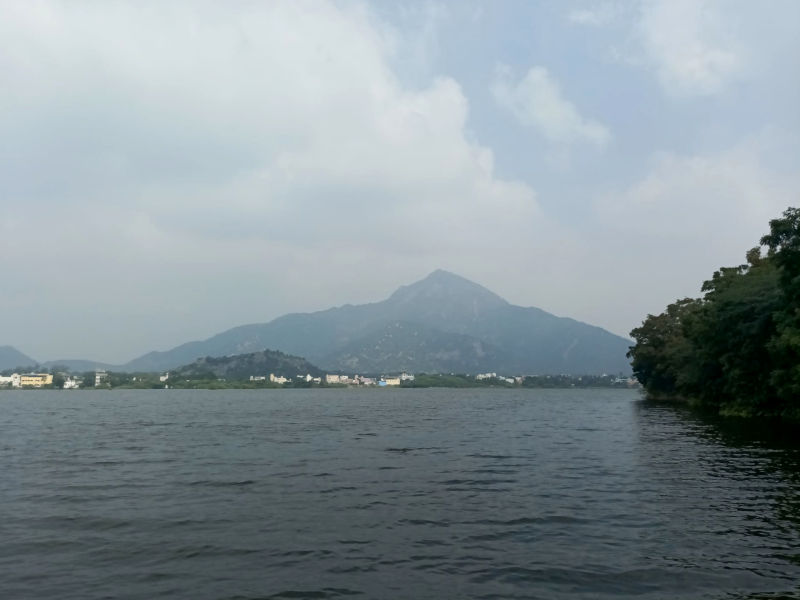
I had done my best to prepare my four German companions for India. Water is an issue. The toilet is a task. Crossing the street can be threatening. Beggars can be irritating and/or heart-breaking. Monkeys might steal your food. I wanted to prepare my group for everything, but I couldn’t prepare them completely, and this was good.
Adjusting to very different mannerisms and constant sensory overload was, of course, not the primary goal of our trip. We travelers had meditated together, practiced Qigong together, healed together, and drank plenty of tea together. We wanted to take another step in deepening and maturing our spiritual lives. We wanted to feel the silent mystery within our hearts to help us see how our minds and emotions function. We wanted to meet good, wise, a people doing good work. We wanted fuel for spreading light and love I the world. We were able to do this. How fulfilling!
What did we do exactly? We meditated at the Ramanashram, We spent many hours at the foot of Arunachala mountain, and also went up at the Virupaksha cave where Ramana Maharshi lived silently for seventeen years. We spent time with Werner Meier, a very wise Swiss yogi who has lived in India for 45 years. We also meditated at the magnificent Matrimandir in Auroville. We met the dedicated founders of Deepam, a thriving center for children with severe disabilities. Those were special energetic experiences indeed!
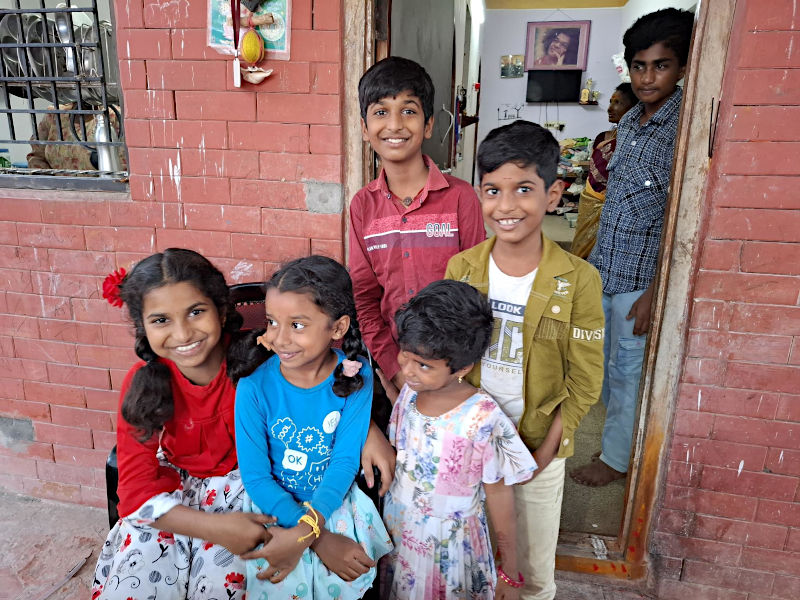
But if I think of the true significance and depth of our trip, what really infused the heart with light and love that carries over into a joyful enthusiasm about life together with others on the earth, was our connection to the local people we met. The Tamil folks seemed to sense where our hearts were and responded with showing their own.
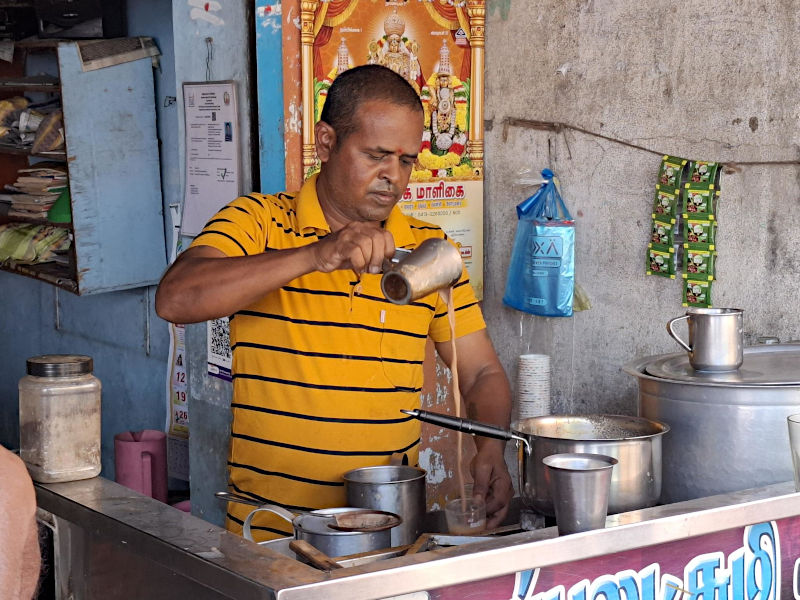
India is a country in transition, but one can still say by European standards (and certainly by Swiss standards) that people live with very small incomes. And still, the local people we met were amazingly generous. We felt it with the men making tea in the chai stalls or the women creating the daily rangoli designs in front of their doorway. Their smiles and kindness resonated a sense that we too belonged in their larger human family, breaking down any ideas of class or color which might want to arise from our conditioned ways of seeing other human beings.
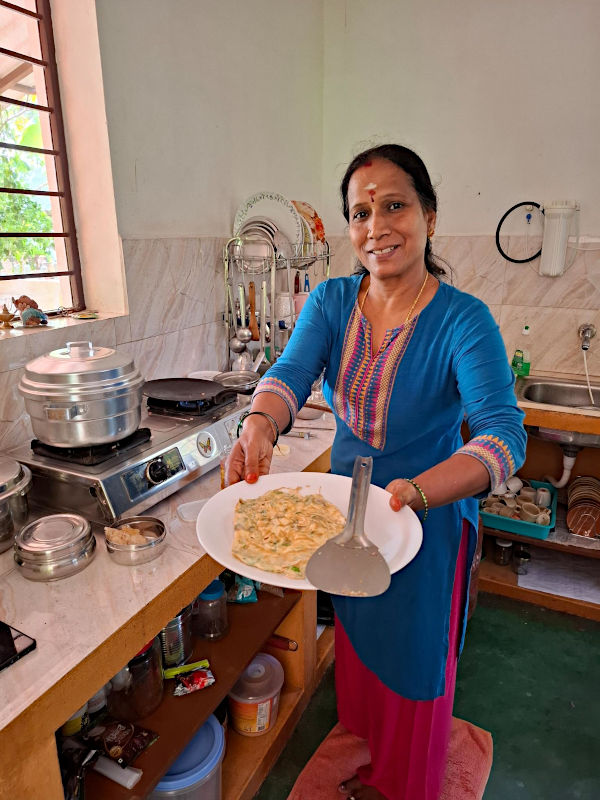
And more than that, a brightness, a glow, emanated from these open people and filled us, seeing and connecting to what we ourselves are; light, love, and creative life-energy. An amazing gift it is, this natural trust arising, allowing the thinking mind to recede and allow qualities deeper in the heart to shine forth. This depth of spirit is our common human experience, providing joy, healing, and natural human goodness.
So, when Germans, Tamils, and an American can experience life so richly together, I ask myself again, why do the dark shadows prevail over so many minds, over our collective human spirit? What don’t we know about ourselves?
If we learn to see our minds clearly, we see that there is greed. Yes, if we are honest, we can all be quite selfish. Think of our emotions around paying taxes. Taxes are a great way for those with more wealth to share with those with less. But instead of enjoying the sharing of our wealth, we shudder at the pressure of owing up each year. We often pay someone quite a bit of money so we can pay less and feel afterwards like we won a game. But who did we beat? Ultimately, we beat ourselves, our collective sharing spirit. Sure, we share generously with family and friends, but for strangers, if they are not of our class or race, even if they are members of our community, we often want to hold back.
I think we have no choice in light of political shifts in the world and lack of mutual trust but to look at our own greed and fears of having less very carefully. New frontiers for our generous spirits will only open in this way.
Life is constant change and exchange. Trees give and take a lot. Animals give and take a lot. Do we humans live from that naturally giving place, or are we scared, guarded, and even miserly.
We were able to give some financial donations in India, but what we received from the people felt like much more. Generosity in abundance. Good for us, good for others, so good that something continues to glow back here in Europe. Would be nice to spread it back to the the USA as well!
I am delighted that my group of travelers, a special education teacher, two social workers, and a businessman, and I had some luminous moments in India. We pass on what we are as well as what we know. Or, “Be the change you want to see in the world,” as Mr. Gandhi said.
Time to look at my taxes.
